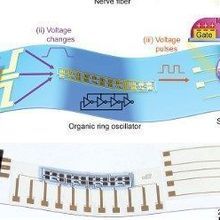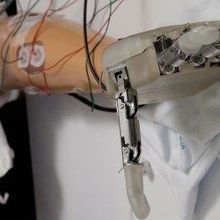nerves

Oral Cancer Survives Starvation with Help from Nearby Nerves
Dan Robitzski | Nov 16, 2022 | 3 min read
Human and mouse oral tumors recruit nerves to produce peptides that the cancer cells need to survive—but this process can be blocked with a migraine drug.

Scientists Identify Neurons Needed to Walk After Paralysis
Amanda Heidt | Nov 10, 2022 | 3 min read
Nine people with spinal injuries walked again after electrical stimulation, allowing researchers to pinpoint neurons likely underlying their recovery.

Mouse Brains Appear to Eavesdrop on Their Fat
Alejandra Manjarrez, PhD | Sep 9, 2022 | 4 min read
For the first time, a team visualizes sensory nerves projecting into adipose tissue in mice and finds these neuronal cells may counteract the local effects of the sympathetic nervous system.

Tiny Nerve-Cooling Implant Relieves Pain in Rats
Shafaq Zia | Jul 1, 2022 | 3 min read
The device can chill nerves as small as a few millimeters across, but more testing and modifications are necessary before it could relieve pain in humans.

Gut Infections Help Shield Intestinal Neurons from Future Damage
Annie Melchor | Nov 19, 2021 | 4 min read
In mice, a kind of immune memory appears to protect the cells against future harm, a finding that could provide insight into treatments for irritable bowel syndrome and other inflammatory digestive conditions.

Neuron-Released Protein Can Set Off Inflammation: Study
Marcus A. Banks | Aug 19, 2021 | 3 min read
Research in mice suggests that moderating nerve activity with drugs or electrical pulses could modify tissue immune responses, curtailing the chronic pain often associated with inflammatory conditions.

Action at a Distance, Circa Early 1950s
Diana Kwon | Dec 1, 2020 | 3 min read
Neuroscientist Rita Levi-Montalcini began her Nobel Prize–winning work in a makeshift laboratory in Italy during the Second World War.

Best of Cancer Research
The Scientist | Sep 23, 2020 | 1 min read
This collection of articles from The Scientist explores some of the latest cancer research!

Infographic: Remote-Controlled Nerves
Ruth Williams | Oct 1, 2019 | 1 min read
A tiny implanted optofluidic device enables researchers to control mouse nerves without touching the animals.

Remote Control of Peripheral Nerves
Ruth Williams | Oct 1, 2019 | 3 min read
An implantable wireless device with microfluidic and optical components allows manipulation of individual nerve fibers in mice’s extremities.

FDA Approves Gene Therapy for Spinal Muscular Atrophy
Ashley Yeager | May 27, 2019 | 3 min read
At $2 million for a single dose, Novartis’s Zolgensma is the most expensive medicine to date, but still less expensive over a lifetime than another approved drug for the rare genetic disease.

Image of the Day: Embryo in Blue
Carolyn Wilke | Jan 7, 2019 | 1 min read
A bright blue stain highlights the sensory nerves of a developing mouse embryo.

Artificial Nerve Senses Pressure, Moves Cockroach Leg
Shawna Williams | May 31, 2018 | 4 min read
The device could one day help enable prosthetics deliver richer touch information to users.

Support Cells Gain Stem Cell-Like Properties After Nerve Injury
Diana Kwon | Dec 1, 2017 | 2 min read
When peripheral nerves are severed, Schwann cells at the injury site begin to proliferate and exhibit stem cell-like gene expression patterns.

Nerve Stimulation Revives Consciousness from Vegetative State
Shawna Williams | Sep 25, 2017 | 2 min read
Low-intensity activation of the vagus nerve appears to have increased a patient’s awareness of his surroundings after 15 years without communication.

Image of the Day: Reunited and It Feels So Good
The Scientist | Jul 28, 2017 | 1 min read
Zebrafish have a remarkable ability to heal their damaged nerve fibers following a spinal injury.

“Waviness” Protects Nerves When Whale Mouths Stretch
Joshua A. Krisch | Feb 20, 2017 | 3 min read
Rorqual whales’ mouths can stretch to more than double their length without causing damage, thanks to two layers of neuronal coiling.

Scientists Grow Intestinal Tissues With Functional Nerves In The Lab
Joshua A. Krisch | Nov 22, 2016 | 1 min read
Researchers are using the tissue, synthesized with human pluripotent stem cells and implanted into mice, to study a rare form of Hirschprung’s disease.

Prosthesis Re-creates Sensation of Touch
Kate Yandell | Feb 5, 2014 | 4 min read
A man whose hand and lower arm were amputated could sense shapes and stiffness and modulate the force of his grasp using a prosthetic hand that was temporarily wired to nerves in his upper arm.
